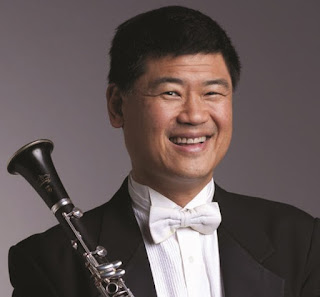Ebony eminence: Yeh's clarinet celebration draws on Chicago achievement
 |
| Veteran clarinetist: John Bruce Yeh joined CSO at 19. |
Chicago chauvinism casts a permanent shadow over much of the Midwest. True, the Indianapolis variety makes its presence felt in my neck of the woods, but with somewhat less authentic glory.
Cedille Records has a large part to play in boosting the Windy City's accomplishments in classical music, chiefly through documenting performers from the metropolis and spreading their art to the world. "Chicago Clarinet Classics" trumpets both its composers and one performer in particular. John Bruce Yeh, assistant principal clarinet in the Chicago Symphony Orchestra, masterminded the program for this disc, and for those pieces not for clarinet alone, collaborated mainly with the CSO's principal keyboardist, Patrick Godon.
On one of the disc's premiere recordings, Teresa Reilly's "The Forgiveness Train," the collaborator is his spouse, the composer. It's a suite with a dream basis and a response to the pandemic. Each of the three sections has a prose-poem guide to the music's significance. In the middle, "The Gifts Beneath the Wounds" bears the most charm, and the trilling interplay picks up the real-world inspiration of bird song.
Older Chicago music is represented by a Leo Sowerby composition, continuing that pillar's earlier representation on Cedille with his Sonata for Clarinet and Piano. Each of the movement's headings sums up the way what follows strikes the ear. Sowerby's music, while not fitting into the neo-romantic tradition, is devoted to tonality but fresh enough to project a distinctive personality. This is a straightforward exhibition of the aesthetic that helped make him a strong presence in Chicago music for decades.
Another showing of tradition in a cosmopolitan city opens the disc: Alexander Tcherepnin's Sonata in one movement for clarinet and piano. Tcherepnin died in 1977 (coincidentally the year that Yeh joined the CSO). The composer's conservative nature is rooted in the dance and folk influences of his native Russia. The piece is fond of scalar patterns, so Yeh's manner of performance emphasizes the exuberant, stepwise flow of Tcherepnin's music.
Stacy Garrop's "Phoenix Rising" places the mythical bird's destruction and revival in an idiomatic clarinet context. Through the use of bending tones and pitchless breaths into the instrument, decked out in quasi-exhausted trills, the phoenix's gradual lifelessness is portrayed; the bird is reborn in the course of rapid figures that also suggest the sparks of the fire from which it emerges.
Shulamit Ran's "Spirit" is dedicated to the memory of Laura Flax, whose death from cancer in 2017 was widely mourned by the new-music and clarinet community. The piece is peppy with lots of leaps in staccato patterns; then the phrases become shorter and increasingly linked. A calm atmosphere with considerable delicacy brings the piece to an ethereal conclusion, an apt memorial touch.
The disc concludes with a formidable work by Robert Muczynski, "Time Pieces" for clarinet and piano. Demands both technical and expressive are distributed generously to both clarinet and piano. The fourth and final piece shows two facets in succession, with its placid mood abruptly abandoned as virtuosity emerges to confirm the recitalist's expert command of his repertoire.



Comments
Post a Comment